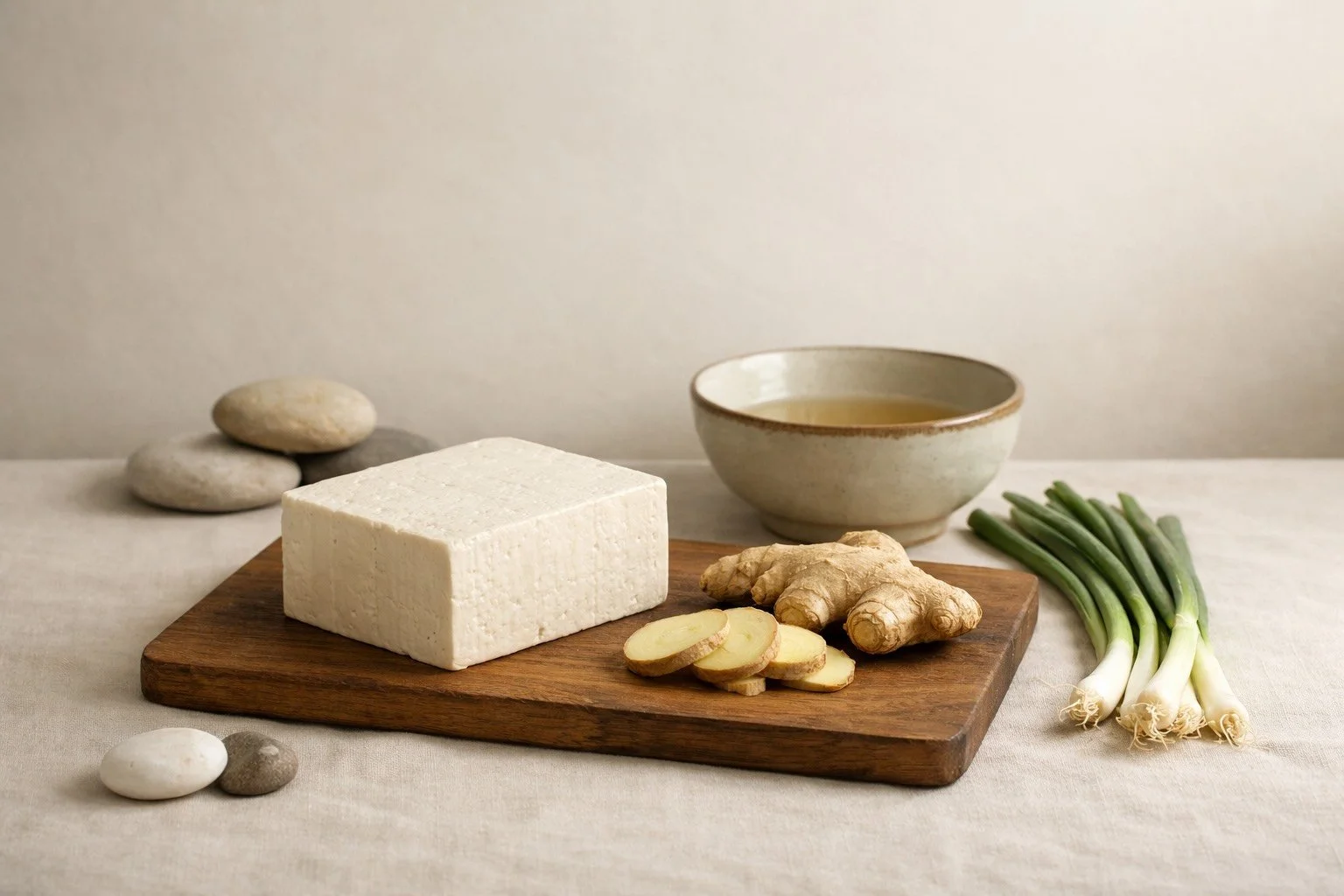Tofu in Traditional Medicine: History, Nutrition and Health
Tofu as Food and Medicine: An Ancient Idea
In much of East Asia, food has never been separate from medicine. The concept that what you eat shapes how your body functions is foundational to systems like Traditional Chinese Medicine (TCM), where ingredients are classified not only by nutrients but by their energetic effects on the body.
Tofu—known historically as doufu—emerged within this worldview. Rather than being seen as a meat replacement, it was understood as a gentle, balancing food: nourishing without excess, strengthening without strain. Ancient medical texts describe tofu as suitable for people recovering from illness, the elderly, and those with digestive weakness.
In other words, tofu wasn’t trendy. It was therapeutic.
The Energetics of Tofu in Traditional Chinese Medicine
In TCM, foods are described by their thermal nature (cooling, warming, neutral), flavour profile, and the organ systems they support.
Tofu is traditionally classified as:
Cooling in nature
Sweet and neutral in flavour
Moistening and calming
This made tofu particularly valuable in conditions associated with excess internal heat—such as inflammation, fever, restlessness, or dryness.
Common traditional uses included:
Supporting recovery from febrile illnesses
Easing digestive irritation
Nourishing yin (fluids, softness, cooling energy)
Counterbalancing overly rich or spicy diets
Importantly, tofu was rarely eaten alone. It was paired with warming ingredients—ginger, scallions, fermented sauces—to create balance, not extremes. This pairing logic mirrors modern culinary wisdom: tofu thrives when thoughtfully seasoned and contextually cooked.
Tofu Beyond China: Broader Traditional Perspectives
While tofu is most deeply rooted in Chinese tradition, similar principles appear elsewhere.
In Ayurveda, soybeans were historically less prominent, but the underlying philosophy aligns closely. Ayurveda also emphasises digestion (agni), balance, and food temperament. Modern Ayurvedic interpretations often view tofu as:
Light and grounding when properly cooked
Easier to digest when warm and spiced
Unsuitable when eaten cold, raw, or overly processed
Meanwhile, Korean temple cuisine embraced tofu as a staple for its calm, non-stimulating nature—ideal for meditation, restraint, and ethical eating. Here, tofu symbolised purity, humility, and respect for life.
Across cultures, the message was consistent: tofu is not a shortcut protein—it is a food of intention.
Traditional Wisdom Meets Modern Nutrition
What ancient practitioners observed intuitively now aligns strikingly with nutritional science.
From a modern lens, tofu offers:
Complete protein with all nine essential amino acids
Highly digestible structure due to its hydrated protein matrix
Calcium and iron (especially when set with calcium salts)
Isoflavones, linked to anti-inflammatory and cardioprotective effects
Traditional medicine valued tofu for being gentle on the system. Modern research confirms this: tofu is low in saturated fat, cholesterol-free, and associated with improved metabolic and cardiovascular markers when part of a balanced diet.
The ancient emphasis on moderation also matters. Tofu was never promoted as a miracle cure—it was a steady, supportive food, consumed regularly but thoughtfully.
When Tofu Was Prescribed, Not Promoted
One of the most striking differences between traditional and modern tofu narratives is intent.
Historically:
Tofu was recommended for specific bodily states
Preparation mattered as much as the ingredient
Texture, temperature, and pairing were considered therapeutic tools
Today:
Tofu is often reduced to macros or labels
Eaten cold, unseasoned, or disconnected from context
Judged quickly when it fails to perform outside its intended role
Traditional medicine reminds us that tofu’s strength lies in appropriateness. Silken tofu for soothing, firm tofu for grounding meals, warm preparations for digestion, cooling ones for heat—each choice was deliberate.
What Tofu in Traditional Medicine Teaches Us Today
Tofu’s medicinal history isn’t about nostalgia. It offers a framework for modern eating:
Food works best when aligned with the body’s needs
Gentle, consistent nourishment often outperforms extremes
Preparation is as important as ingredients
Balance matters more than perfection
In a world obsessed with superfoods and shortcuts, tofu stands quietly as a reminder: health is built through careful repetition, not spectacle.
A Final Thought
Tofu has survived for over two thousand years not because it imitates something else, but because it meets the body where it is. Traditional medicine recognised this long before nutrition labels existed.
Perhaps the real lesson isn’t that tofu is healthy.
It’s that health itself is humble, balanced, and deeply human—much like tofu.
One calm meal at a time, a kinder world begins. 🌱

